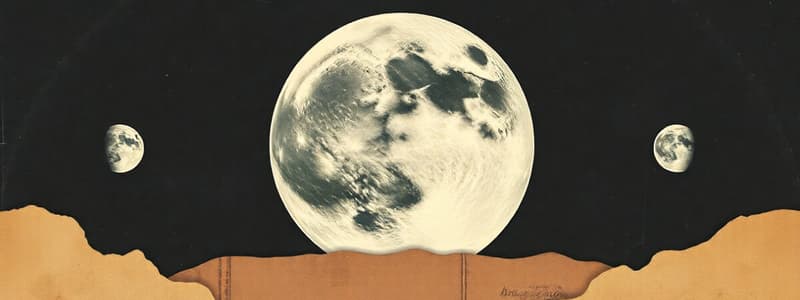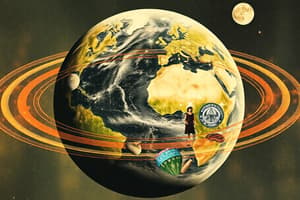Podcast
Questions and Answers
How long does the Earth's rotation on its axis take?
How long does the Earth's rotation on its axis take?
- 12 hours
- 48 hours
- 24 hours (correct)
- 365 days
What is the process called when the Earth travels around the sun?
What is the process called when the Earth travels around the sun?
- Circulation
- Orbiting
- Rotation
- Revolution (correct)
Which moon phase would you find a lunar eclipse happening?
Which moon phase would you find a lunar eclipse happening?
- Waxing Gibbous
- Waning Crescent
- Full Moon (correct)
- First Quarter
In which hemisphere does summer occur when the Earth is tilted towards the sun?
In which hemisphere does summer occur when the Earth is tilted towards the sun?
What is the term for the phases of the moon that include the waxing crescent and waxing gibbous?
What is the term for the phases of the moon that include the waxing crescent and waxing gibbous?
What is the duration of the Earth's revolution around the sun?
What is the duration of the Earth's revolution around the sun?
Which moon phase is associated with the solar eclipse?
Which moon phase is associated with the solar eclipse?
What causes the different phases of the moon as observed from Earth?
What causes the different phases of the moon as observed from Earth?
During which season is the Northern Hemisphere tilted towards the sun?
During which season is the Northern Hemisphere tilted towards the sun?
In what direction does the Earth rotate on its axis?
In what direction does the Earth rotate on its axis?
Flashcards
Earth's Rotation
Earth's Rotation
Earth spinning on its axis, taking about 24 hours.
Earth's Revolution
Earth's Revolution
Earth orbiting the Sun, taking about 365 days.
Moon Phases
Moon Phases
Different shapes of the Moon seen from Earth, caused by changing angles of sunlight.
Lunar Eclipse
Lunar Eclipse
Signup and view all the flashcards
Solar Eclipse
Solar Eclipse
Signup and view all the flashcards
What happens during Earth's rotation?
What happens during Earth's rotation?
Signup and view all the flashcards
What happens during Earth's revolution?
What happens during Earth's revolution?
Signup and view all the flashcards
Waxing vs. Waning Moon
Waxing vs. Waning Moon
Signup and view all the flashcards
Study Notes
Rotation and Revolution
- Rotation is the spinning of Earth on its axis.
- Earth rotates counterclockwise.
- Rotation takes 24 hours.
- Revolution is the motion of Earth traveling around the sun.
- Revolution takes 365 days.
Moon Phases
- Moon phases are changes in the amount of the moon that is visible from Earth.
- These changes are due to the changing relative positions of the Earth, moon, and sun.
- Waxing phases occur when the moon's illuminated portion increases.
- Waning phases occur when the moon's illuminated portion decreases.
- The diagram shows the different phases of the moon (new moon, waxing crescent, first quarter, waxing gibbous, full moon, waning gibbous, third quarter, waning crescent).
Seasons and Eclipses
- Seasons are caused by Earth's tilt on its axis and its revolution around the sun.
- The northern hemisphere experiences summer when tilted toward the sun and winter when tilted away.
- Summer is in the top box and winter is in the bottom box on the diagram.
- The diagram shows the position of Earth during summer and winter..
- Solar and lunar eclipses occur when the sun, Earth, and moon are aligned in a specific order.
- A star could be put by the phase of the moon where lunar eclipses occur.
- A heart could be put by the phase where solar eclipses occur.
Studying That Suits You
Use AI to generate personalized quizzes and flashcards to suit your learning preferences.




